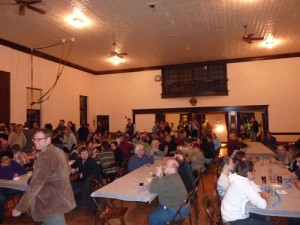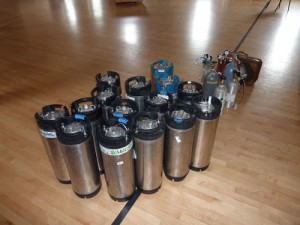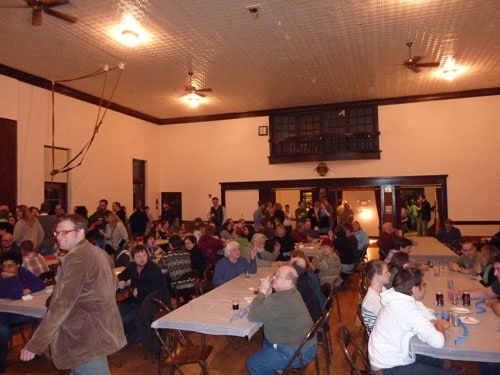 I’ll start today’s post with a little insight into my brewing life; for the past four years I have been the president of a brewclub called the Second Best Brewers. We’re small, with only about 30 members, but enthusiasm is high, and I couldn’t be happier with the group. We get together and talk shop, sample each other’s homebrew, build equipment together, tour breweries together, the whole nine yards. But if I had to pick one thing we do really well, it’s throw a party.
I’ll start today’s post with a little insight into my brewing life; for the past four years I have been the president of a brewclub called the Second Best Brewers. We’re small, with only about 30 members, but enthusiasm is high, and I couldn’t be happier with the group. We get together and talk shop, sample each other’s homebrew, build equipment together, tour breweries together, the whole nine yards. But if I had to pick one thing we do really well, it’s throw a party.
Every February we rent a hall and invite 200 of our closest friends for our annual Febtoberfest party. Febtoberfest is a celebration of how our shared hobby somehow turned into a shared compulsion. This year we had about 25 different batches of homebrew, plus some kegs of cider and soda, with some smatterings of wine thrown in for good measure. There’s always food, and we even made some barley bread this year with spent grain from an APA we made (I’ll publish our recipe soon in another post). We invite some local pros and pick their brains, share our love of beer with our loved ones, and enjoy the evening. In short, Febtoberfest is why I started a club in the first place.
 There’s something truly inspiring about spending time with brewers. Even among the pros, nobody is really a competitor, just someone who shares a mutual passion. While cherished recipes might not be shared, favorite techniques, styles, and best practices flow freely from the mouth of any brewer. Sometimes I feel like I’ve learned more at this one party than during the entire rest of the year.
There’s something truly inspiring about spending time with brewers. Even among the pros, nobody is really a competitor, just someone who shares a mutual passion. While cherished recipes might not be shared, favorite techniques, styles, and best practices flow freely from the mouth of any brewer. Sometimes I feel like I’ve learned more at this one party than during the entire rest of the year.
But it’s not just the brewers who offer up useful information. Sure, it’s nice to hear an expert‘s opinion on your brew using an expert’s lexicon. But it’s just as valuable to hear what your friend’s coworker who only drinks Miller thinks too. We’ve offered up some amazing beers at this event, but there have been one or two stinkers in years past and our guests didn’t hesitate to tell us. Even if it hurts the pride a little, this is great feedback.
This is why it’s so important to have a brewing community of your own, whether through a formal club setting or just a having couple of buddies you brew with once a month. You’ll learn twice as much brewing with a friend as you do on your own. It’s easy to be hypercritical tasting your own beer, so it’s really beneficial to get an outside opinion (conversely I’ve known brewers who think everything they make is gold, and it’s sometimes good for them to hear some dissenting, yet constructive feedback). It is also incredibly helpful to have another perspective on any problems you may have, or just to have another person to kill time with while you wait for your brewpot to boil.
 If you’re an experienced hand at homebrewing, I bet you already know what I’m talking about, but if you don’t or if you’re new to the hobby, I submit this as the most important brewing advice you’ll find on this or any other site. Brew with other people. Talk with other brewers. Share your techniques and preferences. Share what you’re having trouble with and brag about what you’re great at. Drink each other’s beer. Not only will you have immeasurably more fun brewing, you’ll learn more than you thought you could while drinking some great beer. And that’s what it’s all about.
If you’re an experienced hand at homebrewing, I bet you already know what I’m talking about, but if you don’t or if you’re new to the hobby, I submit this as the most important brewing advice you’ll find on this or any other site. Brew with other people. Talk with other brewers. Share your techniques and preferences. Share what you’re having trouble with and brag about what you’re great at. Drink each other’s beer. Not only will you have immeasurably more fun brewing, you’ll learn more than you thought you could while drinking some great beer. And that’s what it’s all about.
For information about brewing clubs in your area, the American Homebrewers Association has a fantastic club directory on their website. ')}

